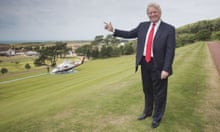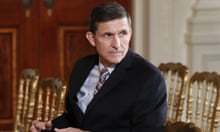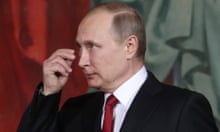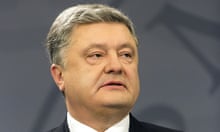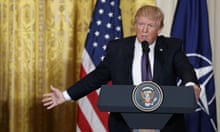An investigation into possible collusion between Donald Trump’s associates and Moscow had been under way for more than three months at the time of the US election and is continuing.
That was the central fact confirmed by James Comey at Monday’s intelligence committee hearing. The FBI director told the committee that the counterintelligence investigation had started in late July, after the initial batch of hacked Democratic National Committee emails were published by WikiLeaks (supplied by the Russians through an intermediary, Comey said) and at about the time Donald Trump issued his infamous invitation to Moscow to hack some more.
“Russia, if you’re listening, I hope you can find the 33,000 emails that are missing. I think you will probably be rewarded mightily by our press,” the candidate said on 27 July.
That also means that the investigation into the Trump team’s Russian links was three months old when Comey made his intervention in the presidential election, announcing 11 days before the vote that new material had been found relevant to the investigation into Hillary Clinton’s use of a private email server.
Comey attempted to explain why he had spoken publicly about the Clinton inquiry while saying nothing about the Trump-Moscow investigation by saying that the FBI had only revealed details of “completed investigations”. That is very unlikely to satisfy doubters, as the rationale for Comey’s “October surprise” announcement on Clinton’s emails is that they meant the case was not closed.
More than four months later, we learned that more than one member of Trump’s campaign has been under investigation and that the possibility is being explored that criminal acts were committed. We know the inquiry is ongoing and it is impossible to say when it will be completed. Counter-intelligence investigations are usually very long and often open-ended.
Very little time on Monday was spent on Trump’s repeated claims that he had been wiretapped by the Obama administration. It was brushed away perfunctorily by Comey and the NSA director, Michael Rogers, who also noted the damage done by the White House spokesman repeating a groundless allegation that the NSA had asked British spies to wiretap Trump on Obama’s behalf.
We learned how far the White House has gone to isolate itself by persevering in those claims and refusing to apologise to the UK for the GCHQ allegation. Rogers agreed that the allegations were not only baseless but had also been “frustrating for a key ally”.
No Republicans bothered to support the president over the allegations, and they had no interest in pursuing the point. Their tactics were to try to keep the focus of their questions on the leaks of classified information from the investigation, speculating on which Obama administration officials could have been responsible, and even raising the possibility of prosecuting journalists for publishing the leaks.
The Democrats tried to build a prosecution case out of the multiple contacts between Trump aides and Russian officials and the failure of the Trump campaign or the Trump White House to disclose them until forced to.
However, Comey and Rogers repeatedly rebuffed questions about which Trump associates were under scrutiny. Nor did they directly confirm or deny reports that an order had been issued as part of the counter-intelligence inquiry under the Foreign Intelligence Surveillance Act (Fisa).
But Comey did go out of his way to say that “disclosure of Fisa is an extraordinarily unusual event” and that the FBI took it very seriously, implying that such a disclosure may have taken place.
It is clear that the extent and scope of the Russian intervention took US law enforcement and intelligence agencies by surprise. Comey said the Russians “were unusually loud in their intrusions. It was almost as if they didn’t care if we knew, or if they wanted us to know”.
Most of all, the opening of the congressional inquiry on Monday took the US deeper into uncharted territory, an investigation into whether a presidential election campaign actively cooperated with a foreign adversary to win, and whether the beneficiary of that intervention was now seeking to cover up that collusion.
